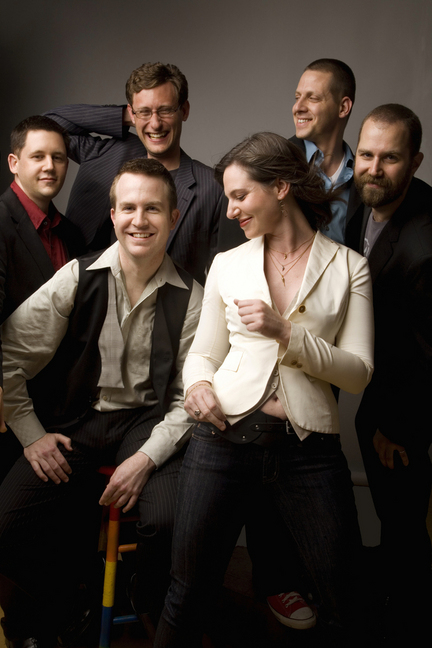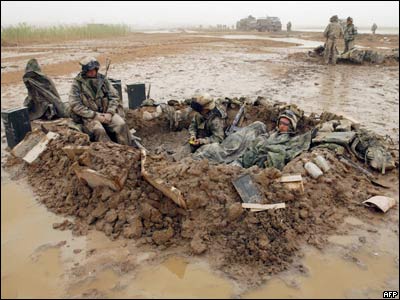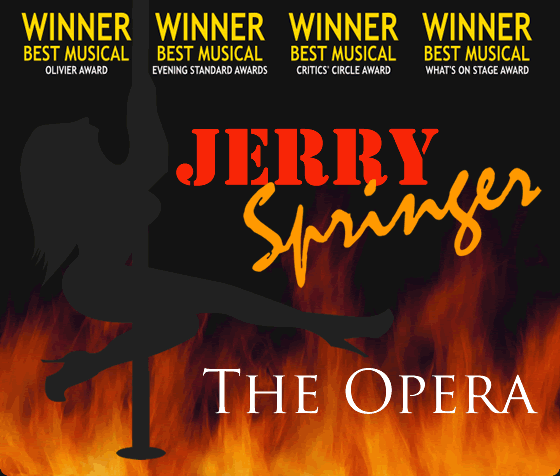
Why don't the guys have their belly buttons showing too?
Just got back from the opening weekend of the Cabrillo Festival of Contemporary Music, a two week celebration of orchestral music written by folks who are actually alive and (with the exception of 87 year old George Walker) present. You couldn’t cross the street in downtown Santa Cruz without falling under Music Director Marin Alsop’s gaze from from atop a signpost. Down by the teeming boardwalk, however, the banners still prominently featured advertisements for Circo Brazil and Flock of Seagulls. You know something’s going on when the music offered in the symphony hall is newer than the music being played on the free stage on the boardwalk.
This weekend’s headliner was composer Jennifer Higdon (continuing her Very Good Year) who presented two concertos composed for specific artists, one for percussionist Colin Currie and the other for chamber sextet Eighth Blackbird (who, in addition to their numerous prizes and awards and Grammys, also has the distinction of having Interlochen Arts Academy student class president Matthew Duvall as their percussionist. I was vice president. Furrealz.) Also featured were three separate offerings from Mark-Antony Turnage and pieces by younger composers Michael Hersch and Anna Clyne.
The concerto may be the most inherently theatrical page out of the orchestral playbook. With your garden variety contemporary orchestral piece, about the only thing you can say about it with any certainty is that sounds will occur. But with a concerto, by necessity you have a solo voice (or voices) and an ensemble voice. The piece will be forced to deal with the interplay between a soloist and a larger ensemble. Sometimes the soloist will play, sometimes the orchestra will play, sometimes they will play together. Add the tightrope wire of virtuosic playing and you have pretty much all you need for some drama.
So audiences have a bit of a headstart with contemporary concertos. They’ve got something to grab onto, expectations that can be met. Concertos are crowd pleasing. And this was certainly true this weekend. Both of Higdon’s pieces were enthusiastically well received, for however “perplexing” (as one audience member was heard to lament at the Saturday evening talk back) some sounds may be to those unfamiliar with the past 80 years of contemporary music, a good ole fashioned display of virtuosity will cut through the most obscured tonal practices.
Friday’s concerto, On a Wire, commissioned by and composed for Eighth Blackbird, begins with a gesture both visually and aurally arresting. The six members of the ensemble all crowd around a single grand piano, extending their hands deep into the frame. It feels more like a medical consultation than the start of a piece, but soon a series of etherial pitches and rumbles emerge from the piano’s body. The entire ensemble is bowing the individual piano strings with what looks like dental floss (we later learned that they’re custom made from the same fibers used for bass bows). It’s a lovely sound and a striking gesture, capitalizing on the ensemble’s irreverent nature while still being an effective musical device.
Higdon did a fine job handling the concerto’s prime directive, namely the interplay between the soloist and the orchestra. In this case, since the soloist is actually itself an ensemble, there is an entire extra dimension of interplay that is available between the solo ensemble and the soloists within the ensemble. It’s, like, a meta-concerto! Or maybe a fractal concerto? The mind boggles at the possible soloist/solo ensemble/orchestral combinations. Fortunately, Higdon’s mind boggled just the right amount, and the combinations shown felt appropriately proportioned; each soloist had opportunities to shine while the group’s precision ensemble work was on prominent display during many flurries of rapid tuplets, particularly in the last minutes of the piece.
Saturday’s Concerto for Percussion is written for a single soloist, although with the battery of instruments strewn in front of the stage, that wasn’t at all apparent. Colin Currie played a marimba, a vibraphone, wood blocks, gongs, and a series of tom toms and cymbals. (Perhaps it’s just me, but I could have used more cowbell.) In something of a collective cadenza for percussion ensemble, Currie joined forces with the entire percussion section of the orchestra, first buzzing through dizzyingly fast tremolos on wood blocks (which Higdon referred to as “the woodpecker section”) and ultimately jamming out on an emphatically rock based rhythm. For a few minutes, the Santa Cruz Civic Auditorium was the site of the most elaborate drum circle in the world.
These isolated moments were more than simple crowd pleasers. They were toeholds into the music, points of arrival and departure, gestures of clarity that were in short supply in the rest of the pieces performed. As much as I loathe to sound like a conservative fuddy duddy, the other pieces presented didn’t provide much that you could (or might want to) grab onto.
If I could identify a trend in the programming of the first two nights, it would be towards a sort of aural maximalism. Every orchestral sound was on display, no instrument remained silent for more than a minute before interjecting a few more notes. I must have imagined this, but I swear that each piece began with a dense crunching chord with full brass, accentuated by a clang from a brake drum. And did all of the pieces really feature a series of staccato dissonances puncturing more sustained, but equally dense sonorities? Is that really that common of a device?
Michael Hersch’s deeply (and I mean DEEPLY) felt Symphony 3 was relentlessly tragic with brass outbursts against painfully dissonant repeated chords in the high strings. Emotion was certainly on display, some sort of lamentation mixed with flashes of rage, but at over 30 minutes, there was little variation in timbre, no sense of arrival or destination, no sculpting of time. Mark-Antony Turnage’s works featured some fun Stravinskyan rhythms, particularly in his brisk Scherzoid (which was one of the rare moments in which the Cabrillo Festival Orchestra felt less than assured) and some expansive lines reminiscent of Berg but it was difficult to discern where the music was going or why. At times I felt like I was listening to the climax of Wozzeck stretched out to last 20 minutes. Anna Clyne’s dance (and John Adams) inspired piece <<<rewind<<< showed some charm and the introduction of prerecorded and altered orchestral sounds in the last seconds of the piece provided a welcome kicker.
If this is the state of the art in orchestral writing, I found myself scratching my head, perhaps not perplexed, but genuinely curious. When you take away functional harmony, when you remove melodic direction, when you have the entire palette of orchestral sounds to choose freely from, what do you do to create expectations? How do you prioritize time? How do you surprise the listener if you’ve already established that there are no rules? These are the challenges for the composer in the 21st century, a challenge that most of the pieces this weekend didn’t meet. Higdon’s work seems confident enough to draw more deeply from music’s traditions and is more effective for it.


